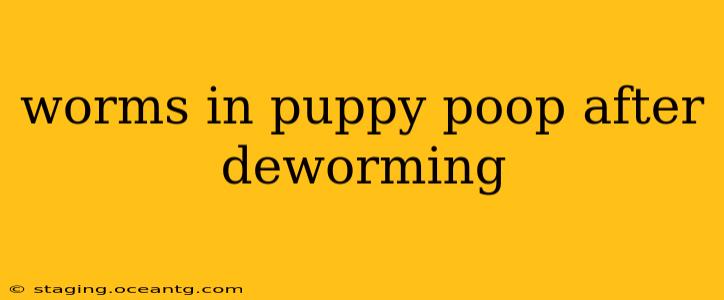Finding worms in your puppy's poop even after deworming is concerning, but it's not uncommon. Several factors can contribute to this, and understanding them is crucial for effective treatment and preventing future infestations. This comprehensive guide will explore the reasons why you might still see worms after deworming your puppy and what steps you should take.
Why Do I Still See Worms in My Puppy's Poop After Deworming?
This is a common question among pet owners. Several factors can explain why deworming might not be completely effective the first time:
-
Incorrect Deworming Medication: Using the wrong type of dewormer or an incorrect dosage can significantly impact its effectiveness. Different dewormers target different types of worms, and a single treatment might not eliminate all parasites. For instance, a dewormer effective against roundworms might not work on hookworms. Always follow your veterinarian's instructions meticulously.
-
Re-infection: Puppies, especially those playing in contaminated areas, are highly susceptible to re-infection. Eggs and larvae of intestinal parasites are incredibly resilient and can persist in the environment for extended periods. Even after deworming, your puppy could easily pick up new worms if exposed to contaminated soil, feces, or contaminated food or water sources.
-
Incomplete Deworming Cycle: Many deworming treatments require multiple doses spaced out over time to completely eliminate the parasite lifecycle. Some parasite eggs may be resistant to a single dose. A veterinarian will usually recommend a deworming schedule tailored to your puppy's age, weight, and parasite load. Failure to complete the entire course can result in persistent worm infestations.
-
Type of Worm: Certain types of worms are more resistant to deworming medications than others. Tapeworms, for example, may require a different type of dewormer compared to roundworms or hookworms. Accurate identification of the worm is crucial for effective treatment.
-
Incorrect Identification of the Worm: It's important to note that not everything that looks like a worm is a worm. Sometimes what appears to be worm segments in the stool could be undigested food. A fecal exam by your vet is the only way to be sure of the type of worm and confirm its presence.
What to Do If You Still See Worms After Deworming Your Puppy?
Don't panic! This isn't necessarily a sign of failure, but it does require prompt attention. Here's what you should do:
-
Collect a Fresh Stool Sample: Gather a fresh stool sample and take it to your veterinarian for examination. This will help identify the type of worm present and determine the most effective treatment strategy.
-
Discuss Your Deworming Regimen: Discuss the deworming medication used, the dosage, and the frequency with your veterinarian. They can assess if the treatment protocol was appropriate and adjust it as needed.
-
Implement Strict Hygiene Practices: Thoroughly clean your puppy's living area, including its bedding, toys, and any areas where it might have defecated. This will help prevent re-infection. Dispose of feces properly.
-
Prevent Re-infection: Limit your puppy's exposure to areas where other dogs might have defecated, and always wash your hands thoroughly after handling your puppy or cleaning up after it. Avoid feeding your puppy raw meat or food that might be contaminated.
How Often Should Puppies Be Dewormed?
The frequency of deworming depends on several factors, including your puppy's age, breed, lifestyle, and the presence of parasites. Your veterinarian will create a personalized deworming plan based on these factors. It's crucial to follow their recommendations closely.
Are there Different Types of Deworming Medications?
Yes, there are various deworming medications available, each targeting specific types of intestinal parasites. Your veterinarian will determine the most appropriate medication based on the identified parasite. Never self-medicate your puppy.
By working closely with your veterinarian and following their recommendations, you can effectively manage worm infestations and ensure the health and well-being of your beloved puppy. Remember, early detection and prompt treatment are key to preventing complications.
